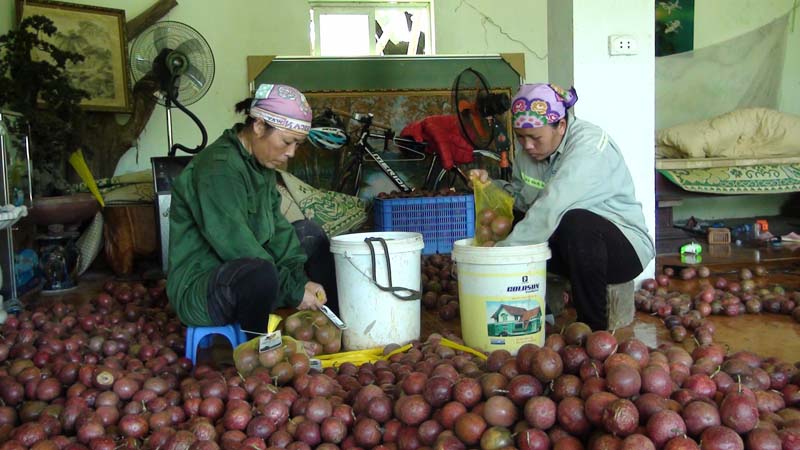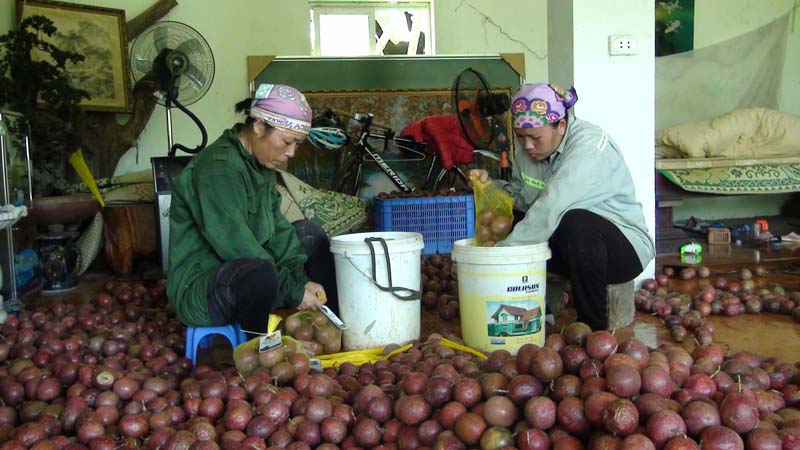
(HBO) - From 5 hectares of trial plantation, which was supported with finance capital and technical investment by Nafoods Passion joint Stock Company (Nghe An, up to now, the local people of Tan Vinh commune (Luong Son) has expanded to 12.5 hectares, mainly in the villages of Coi and Rut. This model opens up a new direction in changing the crop structure of the people living here.

People in Tan Vinh commune (Luong Son) are
harvesting and sorting out types of passions, products which are being ensured
for consumption by VnMart Hanoi supermarkets.
Ms. Bach Thi Phuc, a technical staff at the
safety passion hill of Tan Vinh commune shared: passion trees are easily
adaptable to the local soil and climate, and less pestilent. The planting time
lasts 5 to 6 months. The biggest advantage of the passion tree is its rapid
growth, which is only about 6 months to have flowers, and fruit, the high yield
can be achieved in the first crop, and they are easy to be grown and
fertilized. While being compared to other crops such as oranges, pomelos, they
will take at least 3-4 years to be harvested. Therefore, the passion growers
can get back their capital quickly.
By this time, the area of passion plantation
has expanded to over 3 hectares of Mr. Tran Van Hieu in Rut village can be
harvested about 1 quintal fruit every day. On average, each lemon tree
harvested 60-70 fruits per one, and more than 100 fruits per one with good
care. With a selling price of VND 20,000 - 30,000 / kg, this is a good source
of income for the family.
With the production following VietGap
standard, they cannot use chemical drugs, and they need applying the manual
methods of cultivation, such as using grass cutters, cutting branches, old
leaves to develop plants and especially the products have no preservatives. As
a result, the passion products of Tan Vinh commune in particular and Luong Son
district in general have a place in the market and being contracted to buy
products by VinMart supermarkets in Hanoi.
In order to meet the increasing demand of
consumers, in the coming time, Tan Vinh commune will set up production groups
and production teams to link up the chain to provide many quality passion
products before being sold to the market.
Vice Chairman of the Commune People's
Committee Mr. Hoang Anh Vuong said: Compared with other kinds of crops, passion
trees bring high economic value per unit of cultivation. Average of 1 hectare
of passion can bring out the yield of 35-40 tons of fruit, the profit can reach
at 200 million VND / hectare.
According to data from the Hoa Binh Provincial Party Committee, the industrial production index for the first six months of 2025 is estimated to have increased by 20% compared to the same period last year. This marks the highest year-on-year growth rate for this period since 2020.
In the first six months of 2025, Hoa Binh province’s export turnover was estimated at 1.145 billion USD, marking an 18.11% increase compared to the same period in 2024. Import turnover was estimated at $ 804 million, a 17.15% increase, which helped the province maintain a positive trade balance.
The lives of the ethnic minority farmers in Tan Lac district have gradually improved thanks to the new directions in agricultural production. This is a testament to the collective strength fostered through the professional associations and groups implemented by various levels of the district’s Farmers’ Union.
With the motto the "product quality comes first,” after nearly one year of establishment and operation, Muong village’s Clean Food Agricultural and Commercial Cooperative, located in Cau Hamlet, Hung Son Commune (Kim Boi district), has launched reputable, high-quality agricultural products to the market that are well-received by consumers. The products such as Muong village’s pork sausage, salt-cured chicken, and salt-cured pork hocks have gradually carved out a place in the market and they are on the path to obtaining the OCOP certification.
In the past, the phrase "bumper harvest, rock-bottom prices" was a familiar refrain for Vietnamese farmers engaged in fragmented, small-scale agriculture. But today, a new spirit is emerging across rural areas of Hoa Binh province - one of collaboration, organisation, and collective economic models that provide a stable foundation for production.
Maintaining growing area codes and packing facility codes in accordance with regulations is a mandatory requirement for agricultural products to be eligible for export. Recently, the Department of Agriculture and Environment of Hoa Binh province has intensified technical supervision of designated farming areas and packing facilities to safeguard the "green passport" that enables its products to access international markets.



